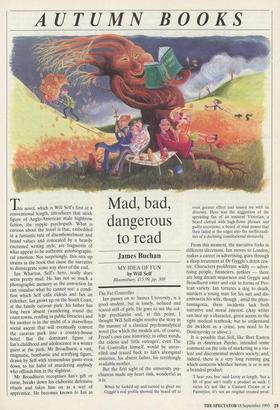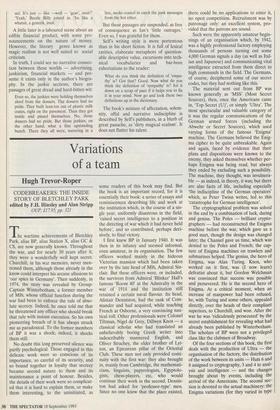AUTUMN BOOKS
Mad, bad, dangerous to read
James Buchan
MY IDEA OF FUN by Will Self Bloomsbury, £15.99, pp. 309 This novel, which is Will Self's first at a conventional length, introduces that stock figure of Anglo-American male highbrow fiction, the yuppie psychopath. What is curious about the novel is that, embedded in a fantastic tale of disembowelment and brand values and concealed by a heavily encrusted writing style, are fragments of what appear to be authentic autobiographi- cal emotion. Not surprisingly, this sets up strains in the book that cause the narrative to disintegrate some way short of the end. Ian Wharton, Self's hero, really does seem pretty mad. He has not so much a photographic memory as the conviction he can visualise what he cannot see: a condi- tion which Self calls eidesis and Ian an eidetiker. Ian grows up on the South Coast, at the family caravan park: his father has long been absent (wandering round the coast towns, reading in public libraries) and his mother is in the midst of a marvellous social ascent that will eventually convert the caravan park into a country-house hotel. But the dominant figure of Ian's childhood and adolescence is a winter guest at the park, Mr Broadhurst, a vast, enigmatic, bombastic and terrifying figure, drawn by Self with tremendous gusto even down to his habit of murdering anybody who offends him in the slightest.
Mr Broadhurst recognises Ian's gift or curse, breaks down his elaborate defensive rituals and takes him on as a sort of apprentice. He becomes known to Ian as The Fat Controller.
Ian passes on to Sussex University, is a good student, but is lonely, isolated and scared stiff of girls. He goes to see the col- lege psychiatrist and, at this point, I thought Will Self might resolve the story in the manner of a classical psychoanalytical novel (for which the models are, of course, Freud's own case histories): in other words, the eidesis and 'little outrages', even The Fat Controller himself, would be unrav- elled and traced back to Ian's aboriginal anxieties, his absent father, his terrifyingly available mother.
But the first sight of the university psy- chiatrist made my heart sink, wonderful as it is:
When he looked up and turned to greet me Gyggle's real profile showed the beard off to even greater effect and teased me with its diversity. Here was the suggestion of the spreading fan of an eminent Victorian, a beard clotted with high-flown phrases and guilty secretions, a beard of mad power that then faded at the edges into the ineffectuali- ties of a declining constitutional monarchy.
From this moment, the narrative forks in different directions. Ian moves to London, makes a career in advertising, goes through a sleep treatment at Dr Gyggle's detox cen- tre. Characters proliferate wildly — adver- tising people, financiers, junkies — there are long dream sequences and Gyggle and Broadhurst enter and exit in forms of Pro- tean variety. Ian tortures a dog to death, murders a young man for his suit and dis- embowels his wife, though , amid the phan- tasmagoria, these incidents lack both narrative and moral interest. (Any writer can lace up a character, given access to the right medical textbook; but to understand the incident as a crime, you need to be Dostoyevsky or above.) It is possible that Self, like Bret Easton Ellis in American Psycho, intended some comment on the role of marketing in a vio- lent and discontented modern society; and, indeed, there is a very long running gag which concerns whether heroin is or is not a branded product:
`I hear you, bro' said Leroy at length, tut a bit of gear ain't really a product as such. I mean it's not like a Custard Cream or a Painstyler, it's not an original created prod- uct. It's just — like —well — 'gear', innit?' `Yeah,' Beetle Billy joined in. 'Iss like a whatsit, a generik, innit.'
A little later is a laboured scene about an edible financial product, with some pro- nouncements on the nature of money. However, the literary genre known as magic realism is not well suited to social criticism.
In truth, I could see no narrative connec- tion between these worlds — advertising, junkieism, financial markets — and pre- sume it exists only in the author's biogra- phy. In the junkie sections, there are passages of great dread and hard-bitten wit:
Even so, the junkies were holding themselves aloof from the dossers. The dossers had no pride. They built lean-tos out of plastic milk crates, right on the pavement. Then they got inside and pissed themselves. No, those dossers had no pride. But those junkies, on the other hand, what a fine upstanding bunch. There they all were, wavering in a line, necks craned to catch the junk messages from the hot ether.
But these passages are suspended, as free of consequence as Ian's `little outrages.' Even so, I was grateful for them.
Self s writing style is more portentous than in his short fiction. It is full of lexical rarities, elaborate metaphors of question- able descriptive value, excursions into tech- nical vocabularies and bar-bore exhortations to the reader:
What do you think the definition of 'empa- thy' is? Got that? Good. Now what do you think the definition of 'sympathy' is? Jot it down on a scrap of paer if it helps you to fix it in your mind. Now go and look these two definitions up in the dictionary.
The book's mixture of affectation, solem- nity, offal and narrative indiscipline is described by Self s publishers, in a blurb of great panache, as `dirty magical realism'. It does not flatter his talent.



































































 Previous page
Previous page